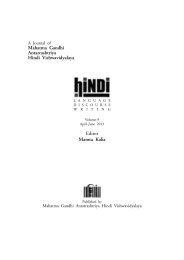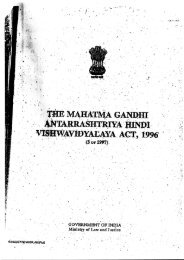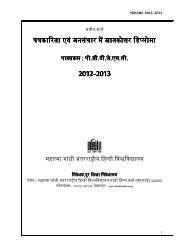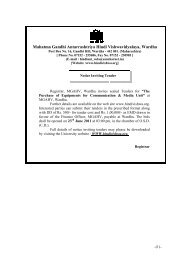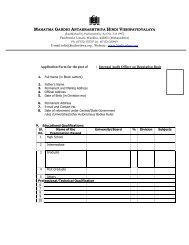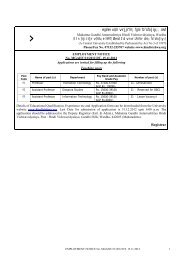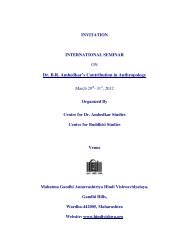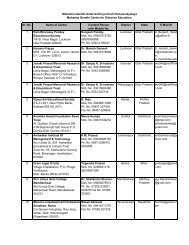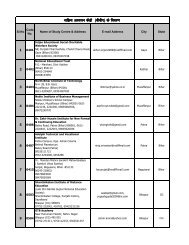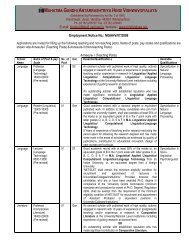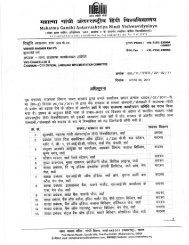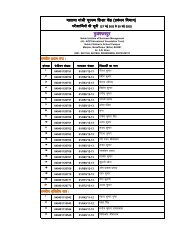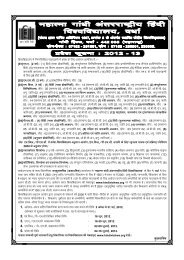Mamta Kalia
Mamta Kalia
Mamta Kalia
Create successful ePaper yourself
Turn your PDF publications into a flip-book with our unique Google optimized e-Paper software.
as well as the rhetorical use of the<br />
interrogative sentence without a subject.<br />
]oothan, by thus bifurcating its<br />
readership, inscribes the divisions of a<br />
caste, and class based society. Valmiki<br />
does not, cannot, claim the authority<br />
to address a national collectivity. On<br />
the contrary, he aims to point out the<br />
exclusion of people like him from the<br />
imagined community of the nation.<br />
While the indictment of an unjust<br />
social system and its benefactors is one<br />
thrust of the text, its other important<br />
preoccupation is to examine Dalit lives<br />
substantively. ]oothan combines<br />
representations of struggles with the<br />
external enemy with the enemy within:<br />
the internalization by Dalit people of<br />
upper caste brahminic values, the<br />
superstitions of Dalit villagers, the<br />
patriarchal oppression of Dalit women<br />
by their men, the attempts by Dalits<br />
who have attained a middle class<br />
economic status to ‘pass’ as high castes<br />
and the attendant denial of their roots,<br />
their inferiority complex which makes<br />
them criticize the practice of rearing<br />
pigs by rural Dalits, all these aspects<br />
of Dalit struggle are an equally important<br />
aspect of ]oothan. This self critique has<br />
earned him brickbats from many Dalits<br />
who find the frank portrayal of Dalit<br />
society to be humiliating. For them, it<br />
is tantamount to washing dirty linen in<br />
public. Valmiki accuses these Dalits to<br />
have succumbed to Brahminism. His frank<br />
critique of his own family members who<br />
hide their caste and therefore deny their<br />
relationship to Valmiki in public must<br />
have been very painful to the persons<br />
involved, particularly since they have<br />
been named.<br />
]oothan, then, is a multivalent,<br />
polyvocal text, healing the fractured self<br />
through narrating, contributing to the<br />
archive of Dalit history, opening a<br />
dialogue with the silencing oppressors,<br />
and providing solace as well as frank<br />
criticism to his own people. Its overall<br />
effect is truly paradoxical. For the fact<br />
that Valmiki has become a speaking<br />
subject indicates that Indian democracy<br />
has opened some escape hatches through<br />
which a critical mass of articulate,<br />
educated Dalits has emerged. On the<br />
other hand, the harsh realities that he<br />
portrays so powerfully underscore the<br />
fact that the promises made in the<br />
Constitution of independent India have<br />
not yet been fully met. ]oothan stridently<br />
asks for the promissory note, joining<br />
a chorus of Dalit voices that are<br />
demanding their rightful place under the<br />
sun. A manifesto for revolutionary<br />
transformation of society and human<br />
consciousness, ]oothan confronts its<br />
readers with difficult questions about<br />
their own humanity, and invites them<br />
to join the universal project of human<br />
liberation.<br />
Courtesy Samya, Kolkata<br />
April-June 2010 :: 31



